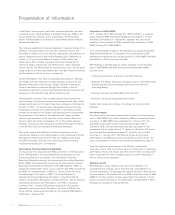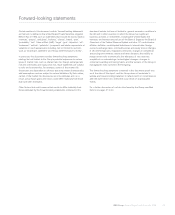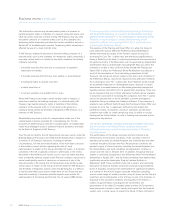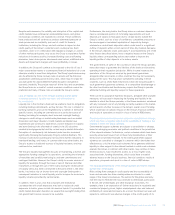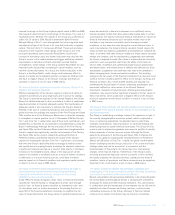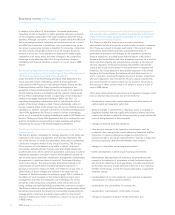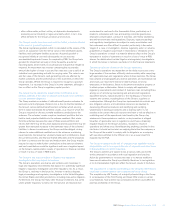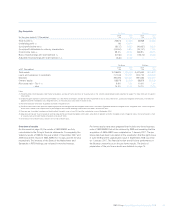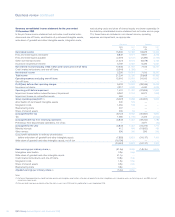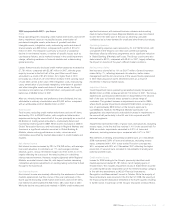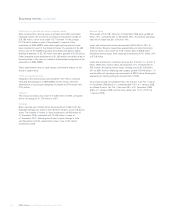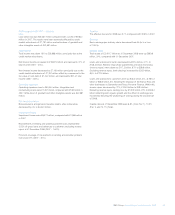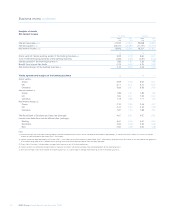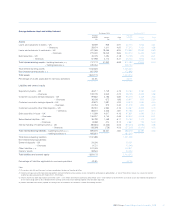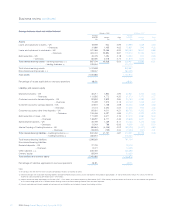RBS 2008 Annual Report Download - page 33
Download and view the complete annual report
Please find page 33 of the 2008 RBS annual report below. You can navigate through the pages in the report by either clicking on the pages listed below, or by using the keyword search tool below to find specific information within the annual report.
RBS Group Annual Report and Accounts 200832
Business review continued
In addition to the effects of consolidation, increased government
ownership of, and involvement in, banks generally may have an impact
on the competitive landscape in the major markets in which the Group
operates. Although, at present, it is difficult to predict what the effects of
this increased government ownership and involvement will be or how it
will differ from jurisdiction to jurisdiction, such involvement may cause
the Group to experience stronger competition for corporate, institutional
and retail clients and greater pressure on profit margins. Since the
markets in which the Group operates are expected to remain highly
competitive in all areas, these and other changes to the competitive
landscape could adversely affect the Group’s business, margins,
profitability and financial condition or result in a loss of value in RBS
shares.
The Group has agreed to certain undertakings in relation to the
operation of its business in the First Placing and Open Offer Agreement
and the Second Placing and Open Offer Agreement.
Under the terms of the First Placing and Open Offer Agreement, the
Group provided certain undertakings aimed at ensuring that the
subscription by HM Treasury for the relevant Ordinary Shares and the
Preference Shares and the Group’s potential participation in the
guarantee scheme promoted by HM Treasury as part of its support for
the UK banking industry is compatible with the common market under
EU law. These undertakings include (i) supporting certain initiatives in
relation to mortgage lending and lending to SMEs until 2011, (ii)
regulating management remuneration and (iii) regulating the rate of
growth of the Group’s balance sheet. These undertakings, while not
having a material effect on the Group, may still serve to limit the Group’s
operations. In addition, pursuant to the terms of the Second Placing and
Open Offer Agreement, the Group is subject to further undertakings,
which are (i) to extend the lending commitments made to HM Treasury in
the First Placing and Open Offer Agreement and (ii) to increase the level
at which competitively priced lending is made available and actively
marketed by the Group in the United Kingdom by £6 billion.
The Group could fail to attract or retain senior management or other
key employees.
The Group’s ability to implement its strategy depends on the ability and
experience of its senior management and other key employees. The
loss of the services of certain key employees, particularly to competitors,
could have a negative impact on the Group’s business. The Group’s
future success will also depend on its ability to attract, retain and
remunerate competitively with its peers and retain highly skilled and
qualified personnel, which cannot be guaranteed, particularly in light of
heightened regulatory oversight of banks and heightened scrutiny of,
and (in some cases) restrictions placed upon, management compensation
arrangements, in particular those in receipt of Government funding
(such as the Group). The Group recently announced changes to its
compensation structure which included significant reductions in
bonuses to be paid in respect of 2008, and limitations on pay rises in
2009. Details of these changes are outlined in the letter from the
Chairman of the Remuneration Committee on page 159. In addition to
the effects of such measures on the Group’s ability to retain senior
management and other key employees, the marketplace for skilled
personnel is becoming more competitive, which means the cost of
hiring, training and retaining skilled personnel may continue to increase.
The failure to attract or retain a sufficient number of appropriately skilled
personnel could prevent the Group from successfully implementing its
strategy, which could have a material adverse effect on the Group’s
financial condition and results of, operations or result in a loss of value
in RBS shares.
Each of the Group’s businesses is subject to substantial regulation
and oversight. Any significant regulatory developments could have an
effect on how the Group conducts its business and on its results of
operations and financial condition.
The Group is subject to financial services laws, regulations,
administrative actions and policies in each location in which it operates.
All of these are subject to change, particularly in the current market
environment, where there have been unprecedented levels of
government intervention and changes to the regulations governing
financial institutions, including recent nationalisations in the United
Kingdom, the United States and other European countries. As a result of
these and other ongoing and possible future changes in the financial
services regulatory landscape (including requirements imposed by
virtue of the Group’s participation in any government or regulator-led
initiatives), the Group expects to face greater regulation in the United
Kingdom, the United States, the Netherlands and other countries in
which it operates, including throughout the rest of Europe. Compliance
with such regulations may increase the Group’s capital requirements
and costs and have an adverse impact on its business, the products
and services it offers and the value of its assets or result in a loss of
value in RBS shares.
Other areas where governmental policies and regulatory changes could
have an adverse impact include, but are not limited to:
•the monetary, interest rate, capital adequacy and other policies of
central banks and regulatory authorities;
•general changes in government or regulatory policy or changes in
regulatory regimes that may significantly influence investor decisions
in particular markets in which the Group operates or may increase the
costs of doing business in those markets;
•changes to financial reporting standards;
•other general changes in the regulatory requirements, such as
prudential rules relating to the capital adequacy framework and the
imposition of onerous compliance obligations, restrictions on
business growth or pricing and requirements to operate in a way that
prioritises objectives other than shareholder value creation;
•changes in competition and pricing environments;
•further developments in the financial reporting environment;
•differentiation amongst financial institutions by governments with
respect to the extension of guarantees to bank customer deposits
and the terms attaching to such guarantees, including requirements
for the entire Group to accept exposure to the risk of any individual
member of the Group, or even third party participants in guarantee
schemes, failing;
•implementation of, or costs related to, local customer or depositor
compensation or reimbursement schemes;
•transferability and convertibility of currency risk;
•expropriation, nationalisation, confiscation of assets;
•changes in legislation relating to foreign ownership; and




